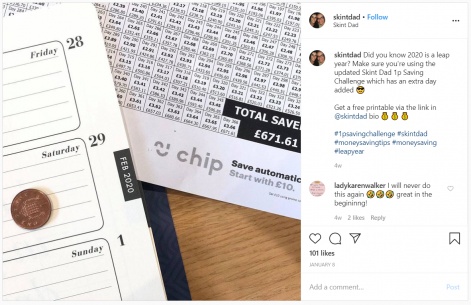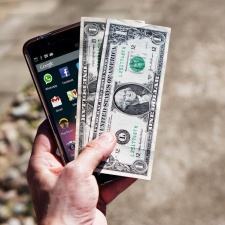After a Christmas-blowout, a cursedly long month and living for payday - we cling to the words of money-saving influencers to get us through January skintness.
King of them all, Martin Lewis, is the nation’s go-to source for cash-strapped hacks. ‘The Martin Lewis Money Show’ has a prime-time, post-Corrie slot, and his multi-award-winning website, Money Saving Expert, attracts 16 million users a month.
From manipulating Easyjet fares to finding the cheapest British Gas deal, this in-depth budgeting content plays a huge role in the blogging sphere. And while many Brits simply love a good bargain, the need for these influencers is arguably a deeper and more urgent political issue.
Below the breadline
According to an independent study by the Social Metrics Commission, more than four million people in the UK are trapped in deep poverty, with an income at least 50% below the official “breadline”. In cash terms, as summed up by The Guardian, this means that “a couple with two children would have an income of less than £211 a week after housing costs, and a single parent with one child would be on less than £101.50 a week”.
One money-saving influencer who resonates with those experiencing these rising levels of hardship is Skint Dad. As well as his penny-pinching tips, this influencer connects on a deeper level with his followers by being open about the cross over between money and mental health as well. Here’s one case study of a genuinely useful, well-executed brand partnership the father, husband and money-making enthusiast has nailed.
Who's involved?
Ricky Willis started award-winning website Skint Dad after escaping a mountain of debt and barely being able to afford food. Today, Ricky and his wife Naomi share the ways they cut costs to their thousands of followers, telling their story, past mistakes and the savvy tips they’ve learned along the way. For this campaign, they partnered with Chip - an app that automatically saves up money for you - to deliver a tool that helps those below the breadline budget successfully.
Purpose of campaign
All of Skint Dad’s blog posts follow the same underlying philosophy - to provide practical tips that help followers maximise their cash and stay out of debt. This campaign is no different. The ‘1p saving challenge’ helps readers save more than £650 a year, building stronger brand trust and visibility, while landing affiliate sales. The blog post was first created in 2015, but continues to be updated every year - a genius example of evergreen content.

Process
Within the step-by-step blog post, Skint Dad links to free calendars in different formats (PDF/Excel) that readers can print out and fill in as they carry out the challenge. There are multiple options for those on different budgets (and those who prefer old-fashioned methods of saving), while the call-to-action urges more tech-savvy readers to download the Chip app.
The incentive: £10, for free, with Ricky’s personalised code #SKINT10. Skint Dad shared the calendar in use within multiple Instagram posts, to illustrate its real-life application to his 13.7K followers. He then reshared the calendar in January 2020, reminding previous users to update their current print-out due to the leap year, while promoting the content to new followers who might not have known about it.
Analysis
It’s clear that this post is sponsored - both the beginning and final paragraphs of the blog declare affiliate links are present. But, due to the brilliant pairing of brand and blogger, the organic partnership means that the paid-for post is far from glaringly obvious. In fact, teaming up brings even more value to the content. With hundreds of likes and a deluge of comments from social media users, delighted at how much they’ve saved with this frugal strategy, it’s clear the post increased Skint Dad’s authority as a helpful money-saving influencer and was a successful sponsorship pairing with Chip. By branding the 1p challenge calendar printable (he even made sure it fit to one A4 page, to save printing costs), this brand awareness is built both offline and online. It takes the logos and details of both Skint Dad and Chip off phone screens and into homes.

Outcome
In order for money-saving influencers and brands to connect with audiences in a sponsored post, there needs to be an organic fit between the two. Skint Dad and Chip take this a step further, making the content extra valuable by creating practical solutions for both old-school savers and tech-savvy mobile users. It’s strikingly obvious that Skint Dad knows his audience - his family values, real-life practicality and selfless goal (to help followers become financially better off) have led to a solid fanbase, including a Skint Dad community group of more than 46K members.
He knew the 1p challenge would be genuinely useful for this community, because he lives and breathes it. It’s this authenticity, real-life know-how and smart content creation that makes this campaign powerful - it’s far from forced, is totally relevant and helps cash-strapped followers save starting with only the tiniest amount of British currency - one single penny. By ploughing his energy into one solid piece of evergreen content, Skint Dad is an ideal example of working smarter, not harder. Influencers, brands and marketers - take note.















